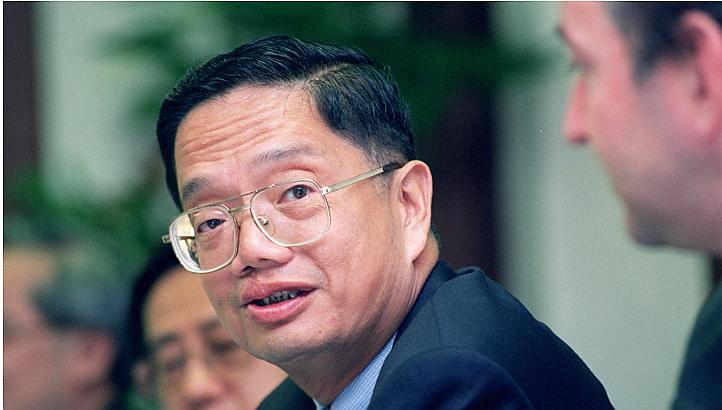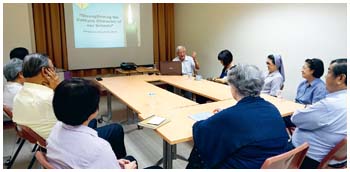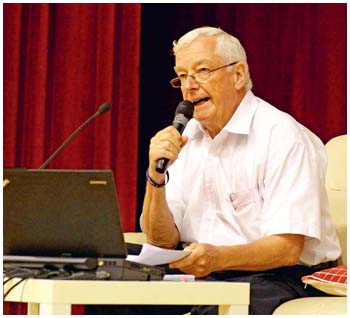At the 2015 Catholic Education Conference, Archbishop Goh and Jesuit priest exhorted educators to point to the source of Catholic values and talk about the stories of their Religious founders. Catholic News reporter Mel Diamse-Lee sat in.
Archbishop William Goh challenged educators to speak of the source of values, Christ, to their students during teachable moments.
The impassioned homily of Archbishop William Goh rang out throughout the packed auditorium of St Gabriel Secondary School on March 16 as he encouraged teachers to talk about Catholic values to their students and point to Christ as the source of these values.
“A Catholic school that does not proclaim Christ explicitly at the end of the day, I don’t think is a Catholic school,” Archbishop Goh told some 400 Catholic educators, parents, members of school management committees and Religious Brothers and Sisters attending the Catholic Education Conference organised by the Archdiocesan Commission for Catholic Schools (ACCS).
At the Mass prior to the conference, he said that with the world changing rapidly as a result of technology, science and mass communication, “traditional values that we hold so strongly and steadfastly are being eroded away”.
Noting that “all our Catholic schools started with strong moral and religious values,” he added that “perhaps the current generation of leaders that we have … benefitted from our Christian Catholic education”.
However, because of secularisation and the negative effects of relativism, individualism and consumerism, these values are being challenged.
“What distinguishes us from non-Christian schools? Our values ultimately, are not simply ethical values, no, they are the values founded in Christ. Christ is the centre of all we do. When we give them [students] values but don’t give them the source of the values, we shortchange them. It’s like giving fish to people but we don’t teach them how to fish.”
Addressing teachers in the audience, he said, “As educators, you are to form minds. Your task is to give life. More than the physical and material, your task is to give the fullness of life … Ask yourselves, ‘Are we sincere in giving [students] a fuller life?’ ”
The archbishop also noted the four major challenges facing Catholic schools today: the dwindling population of Catholic students, the declining presence of Religious, whom he called “icons of the sacred”, from their schools; the role of the Ministry of Education (MOE) as the main payer and policy maker; and the autonomous way Catholic schools are run, being sponsored by various Religious congregations.
Keynote speaker, Jesuit Fr Christopher Gleeson, emphasised that telling stories, like Jesus did with parables, reinforces the Catholic identity of schools.
Character of Catholic schools
Picking up from where Archbishop Goh left off, Fr Gleeson gave the conference participants an opportunity to reflect on the theme of the conference, The Character of Catholic Schools. He put together a slide presentation with through-provoking quotations.
An educator for 21 years, he based his morning talk on the Vatican’s 2014 document, Educating Today and Tomorrow – A Renewing Passion.
Storytelling is a powerful way of transmitting the character of Catholic schools, Fr Gleeson said.
“Good storytelling builds on the experience of one’s listeners. The parables, which Jesus told, are ‘springboard stories’ leading people to discover the answers for themselves.”
From the Vatican document, he quoted: “Teachers are called upon to rise up to a major educational challenge, which is the recognition, respect and enhancement of diversity.”
He also spoke about “sacramental vision”, of finding God in all things, and being found by God in all things. “The test of our education is if we are able to produce people of discernment.”
Fr Gleeson’s afternoon talk focused on the character of a teacher, picking out the walk to Emmaus (Luke 24:13-35) as a model for teaching.
Pedagogy is about accompaniment, Fr Gleeson said. In the Gospel where Jesus met two discouraged disciples leaving Jerusalem, Jesus models the six “best elements of companionship”: walking with others, listening to their heart, telling a story, disposing (not imposing) blessing, and setting hearts on fire.
“True education is about transformation, and all teachers are, or should be, important figures in the lives of their students,” he said.
During the breakout session, where participants were grouped according to school levels, four questions were posed based on the sharing of Fr Gleeson on the key characteristics of Catholic schools that are successfully nurtured, challenges of operationalising what has been discussed, and which of the challenges participants would want to take up to help Catholic schools realise their Catholic identity.
Fr Edward Seah, acting executive director of ACCS, also gave an update on the seven key areas of improvement identified at the ACCS conference in September 2013. Among these were the creation of a directory of Catholic educators, school chaplaincy teams, greater laity involvement, formation and induction of principals and vice principals, and implementation of a Catholic ethos self-assessment framework and a Civics and Moral Education/Religious Education curriculum.
Feedback
Participants at the conference felt encouraged and inspired by the homily and reflection points given.
Canossian Sr Margaret Goh, lead chaplain and supervisor of the four Canossian Schools and St Magdalene’s Kindergarten, said, “The conference was well thought through, especially with Fr Edward giving an update on what ACCS has accomplished in the key areas for improvement. I embrace the bishop’s challenge of evangelising in the sense that there is a need to point to the source of values. The [Catholic] schools can be avenues for evangelisation, without imposing.”
Mr Eugene Yeow, a Catholic Junior College teacher, said, “It was good for me to know that the good practices are there. The spiritual health of schools is not as bad as we are led to believe, although it could be better. Kerygma [ongoing formation] can be provided in order to deepen the faith [of teachers]… so the students get the best out of our own experience.
“The personal challenge would be the mindset of teachers, the tendency for Catholic teachers to be more quiet when it comes to evangelisation. The transformational step is to view why there is a need for it. It is so that the children can see the impact. On a school level, hopefully there would be a continued dialogue between Catholic schools management and MOE.”
Madam Elizabeth Dass, a teacher at the Canossian School (For the Hearing Impaired), felt that the conference was “something like bread, feeding us with information. It was an avenue for sharing with other teachers and sharing faith, opinions, experiences and frustrations. At the end of the day, we can always mention Jesus during teachable times. The conference inspired me to mention Jesus in a teachable way.”
Sr Delphine Kang, supervisor of Marymount Convent School, thought that the conference was “really very good. A lot of people were very excited, very inspired to be witnesses and sacraments in the school. It’s not new but it’s an awakening. It’s good now and again to be reminded.”
Parent volunteer, Ms Clare Leong, said, “I think the conference has been successful in getting the Catholic educators together to work towards a more united direction for all Catholic schools in Singapore. I really appreciated the opportunity to share and to exchange each school’s experiences, ideas and practices.
Source: Catholic News, April 5, 2015, Volume 65, Number 07



